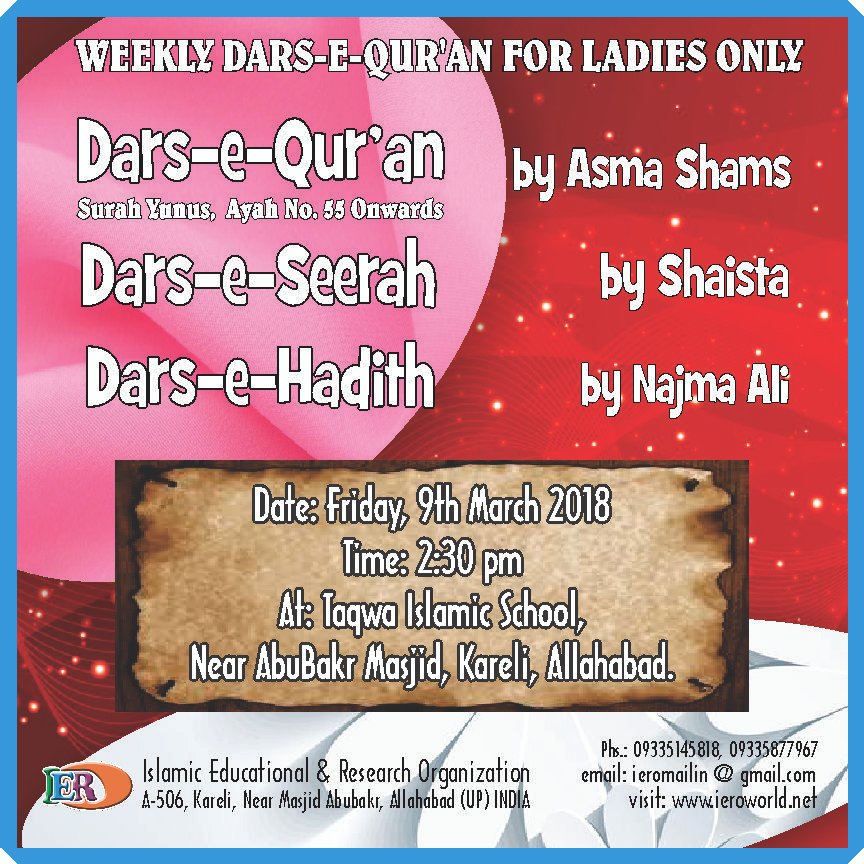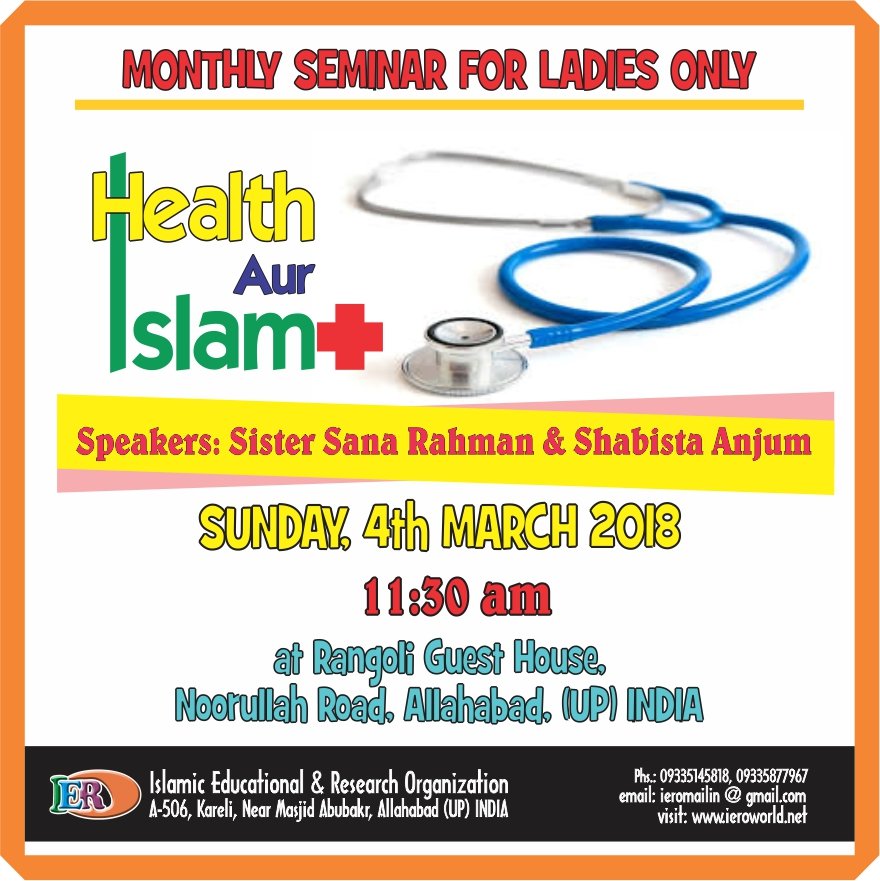
Weekly Dars-e-Qur’an (Ladies) Friday, 12th February 2016
February 10, 2016
Eishwar Aur Uska Maargdarshan
February 11, 2016The Gift of Love
 We all love gifts. We love the blessings that beautify our lives. We love our children, our spouses, our parents, our friends. We love our youth and we love our health. We love our homes, our cars, our money, our beauty. But what happens when a gift becomes more than just a gift? What happens when a want becomes a need, a favor becomes a dependency? What happens when a gift is no longer only that?
We all love gifts. We love the blessings that beautify our lives. We love our children, our spouses, our parents, our friends. We love our youth and we love our health. We love our homes, our cars, our money, our beauty. But what happens when a gift becomes more than just a gift? What happens when a want becomes a need, a favor becomes a dependency? What happens when a gift is no longer only that?
What is a gift? A gift is something that did not come from us. A gift is given—and can be taken. We are not the original owners of a gift. A gift is also not necessary for our survival. It comes and goes. We want and love to receive gifts—but they are not necessary to our existence. We don’t depend on them. We don’t live to receive them and do not die if we don’t. They are not our air or our food. But we love them. Who does not love a gift? Who does not love to receive many gifts? And we ask Al Kareem (The Most Generous) to never deprive us of His gifts. Yet, a gift is still not where we place our dependencies, nor do we die without them.
Remember that there are two places to hold something: in the hand or in the heart. Where do we hold a gift? A gift is not held in the heart. It is held in the hand. So when the gift is taken, the loss creates pain to the hand—but not to the heart. And anyone who has lived long enough in this life knows that the pain of the hand is not like the pain of the heart. The pain of the heart is to lose an object of attachment, addiction, dependency. That pain is like no other pain. It’s not normal pain. And that pain is how we will know we just lost an object of attachment—a gift that was held in the wrong place.
The pain of the hand is also pain—but different.So different. The pain of the hand is to lose, but not something we are dependent upon. When a gift is taken out of the hand—or never given at all—we will feel the normal human pain of loss. We will grieve. We will cry. But the pain is only in the hand; our heart remains whole and beating. This is because the heart is only for God.
And God alone.
If we examine the things in our lives that cause us most pain or fear, we can start to pinpoint which gifts have been stored in the wrong place. If not being able to get married, be with the person we want, have a child, find a job, look a certain way, get a degree, or reach a certain status has consumed us, we need to make a change. We need to shift where the gift is being stored; we need to move the gift out of our heart and back to our hand where it belongs.
We can love these things. It’s human to love. And it’s human to want the gifts we love. But our problem begins when we put the gift in our heart, and God in our hand. Ironically, we believe that we can live without God—but if we were to lose a gift, we crumble and can’t go on.
As a result, we can easily put God aside, but our heart cannot live without the gift. In fact, we can even put God aside for the sake of the gift. So it becomes easy for us to delay or miss a prayer, but just don’t deprive me of my work meeting, my movie, my outing, my shopping, my class, my party, my basketball game. It’s easy to take interest bearing loans or sell alcohol, just don’t deprive me of my profit margin and prestigious career. Just don’t deprive me of my brand new car, and over-the-top home. It’s easy to have a haram relationship or date, but just don’t deprive me of the one I ‘love’. It’s easy to take off, or not wear hijab—just don’t deprive me of my beauty, my looks, my marriage proposals, my image in front of people. It’s easy to put aside the modesty that God says is beautiful, but don’t deprive me of my skinny jeans—because society told me that’s beauty.
This happens because the gift is in our heart, while Allah is in our hand. And what is in the hand can be put aside easily. What is in the heart, we cannot live without—and would sacrifice anything to have. But sooner or later we need to ask ourselves what it is that we really worship: The gift or the Giver? The beauty or the Source and Definition of Beauty? The provision or the Provider?
The creation or the Creator?
The tragedy of our choice is that we chain our necks with attachments, and then ask why we choke. We put aside our Real air, and then wonder why we can’t breathe. We give up our only food, and then complain when we’re dying of starvation. After all, we stick the knife in our chest and then cry because it hurts. So much. But what we have done, we have done to ourselves.
Allah says:
“And whatever affliction befalls you, it is on account of what your hands have wrought, and (yet) He pardons most (of your faults).” (42:30)
Yes. What we have done, we have done to ourselves. But look how the ayah ends: “He pardons most.” The word used here is “ya’foo’ from God’s attribute Al-A’foo. This denotes not just forgiving or pardoning, but completely erasing! So no matter how many times we stick that knife in our own chest, God can heal us—as if the stab had never occurred! Al Jabbar (the One who mends) can mend it.
If you seek Him.
But how foolish is the one who exchanges air for a necklace? He is the one who says, “Give me the necklace, and then you can take away my air after that. Suffocate me, but just make sure I’m wearing the necklace when I die.” And the irony of it all is that it is the necklace itself that suffocates us. It is our own objects of attachment—the things we love more than God— that kill us.
Our problem began because we saw the gift as the air, instead of just that: a gift. So in our blindness, we became dependent on the gift, and put aside the Real air. As a result when the gift was taken back, or never given at all, we thought we could not go on. But, this was a lie that we told ourselves, until we believed it. It isn’t true. There’s only one loss that we can’t recover from. There’s only one reason we wouldn’t be able to go on: If we lost God in our lives. The irony is that many of us have lost God in our lives and we think we’re still alive. Our false dependencies on His gifts have deceived us. So much.
Only God is our survival. Not His gifts. God is our support and our only true necessity. Allah says:
“Is not God enough for His Servant? But they try to frighten thee with other (gods) besides Him! for such as God leaves to stray, there can be no guide.” (39:36)
We all have needs and we all have wants. But our true suffering begins when we turn our wants into needs, and our one true need (God) into a commodity we think we can do without. Our true suffering begins when we confuse the means and the End. God is the only End. Every other thing is the means. We will suffer the moment we take our eyes off the End and get lost in the means.
In fact, the true purpose of the gift itself is to bring us to God. Even the gift is a means. For example, does the Prophet not say that marriage is half of deen? Why? If used correctly, few other parts of this life can have such a comprehensive effect on the development of one’s character. You can read about qualities like patience, gratitude, mercy, humility, generosity, self-denial, and preferring another to yourself. But, you won’t develop those qualities until you are put in a situation in which they are tested.
Gifts like marriage will be a means to bring you closer to God—so long as they remain a means, not an End. God’s gifts will remain a means to Him, so long as they are held in the hand, not the heart. Remember that whatever lives in the heart controls you. It becomes what you strive for and are willing to sacrifice anything to have. And to keep. It becomes what you depend on at a fundamental level. It, therefore, must be something eternal, that never tires, and never breaks. It must, therefore, be something that never leaves.
Only one thing is like that:
The Creator.
By: Yasmin Mogahed
Source: YasminMogahed.com
Courtesy :
www.ieroworld.net
www.taqwaislamicschool.com
Taqwa Islamic School
Islamic Educational & Research Organization ( IERO )








